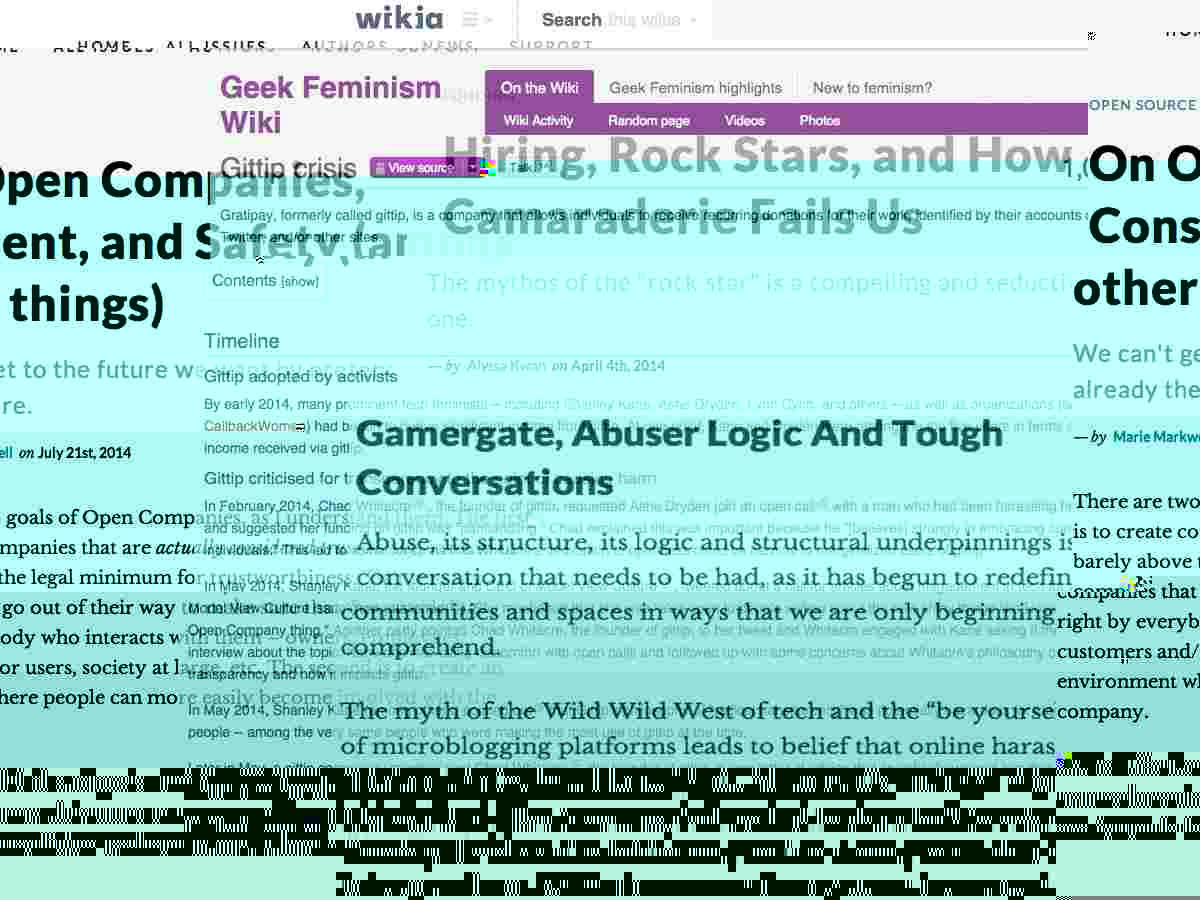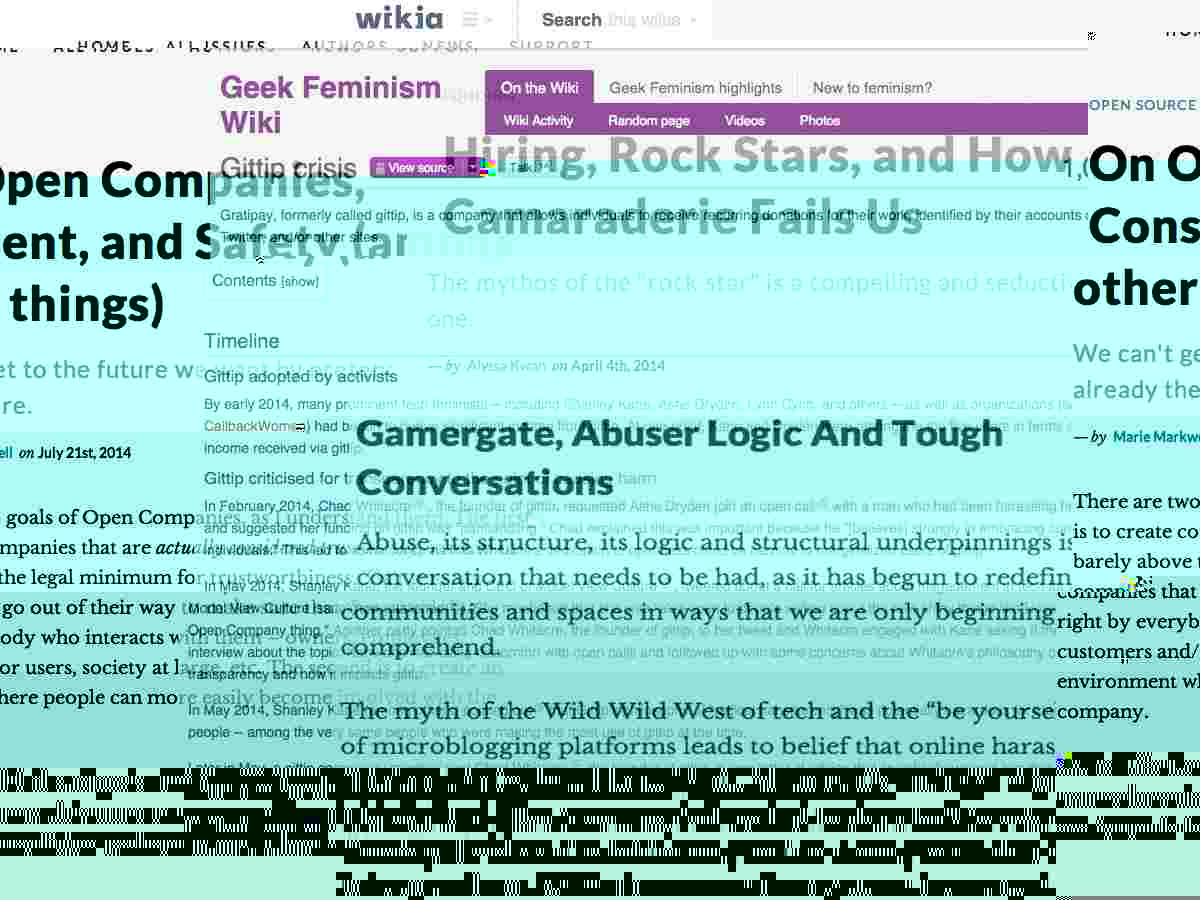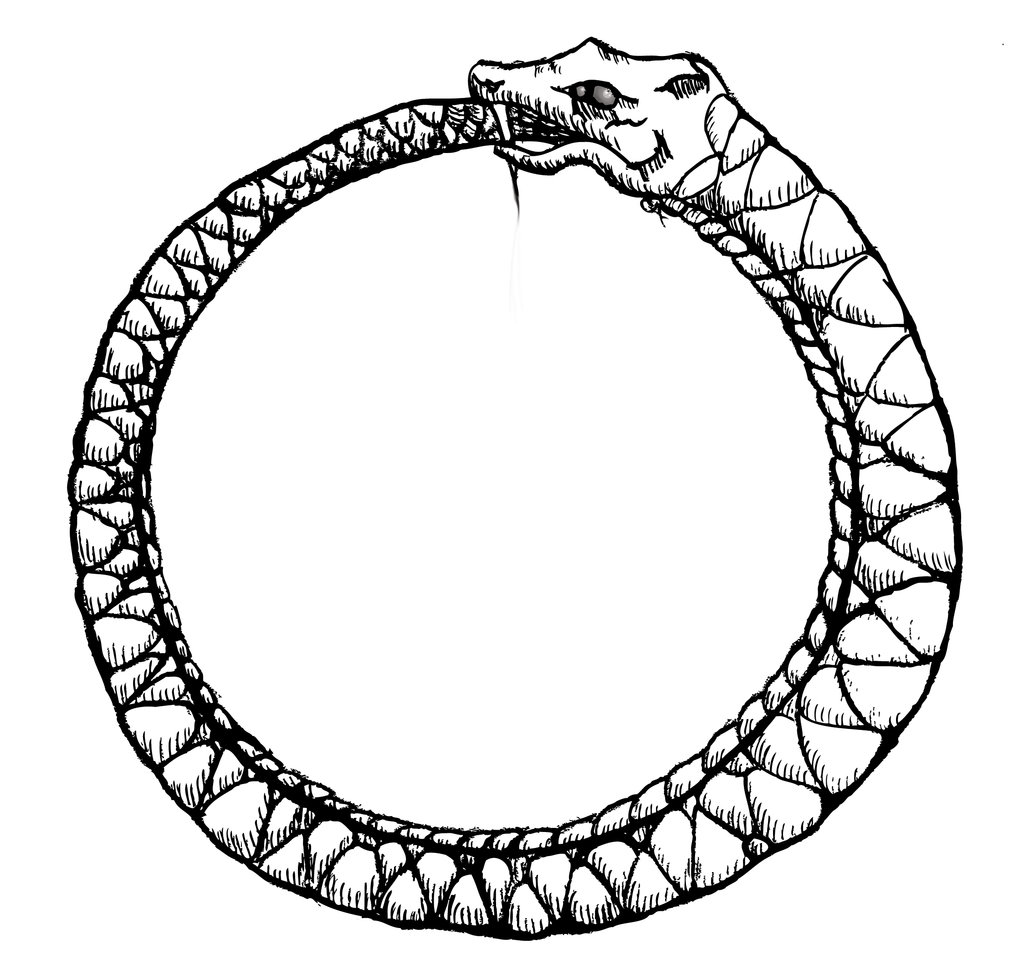These Tech Companies Taking Advantage of Us


The myth of the Wild Wild West of tech and the “be yourself” freedom of microblogging platforms leads to belief[sic] that online harassment is the disconnected work of individuals, when really strategic organizing is taking place. (Sydette Harry, Ouroboros Outtakes: The Circle Was Never Unbroken, Dec 8 2014)
The Circle of Violence
Us vs. Them: we use the same tactics
In the last few days, instead of working on my last videogame project for 2014, a Christmas present for my patrons, I've been struggling with my own problems using (and supporting) Patreon as a means to build a livelihood. It's forced me to examine and reflect on my relationship with Patreon, and my relationship with Twitter. Without Twitter, my efforts to build a Patreon profile would be rather moot. Patreon does not really care about its lesser-known users, just as Twitter (the company, but also the community) does not really care about it's lesser-known users.
Speaking about low profile and high profile, that seems to be one of the recurring themes of this past year, colouring my interactions and activities offline and online.
I've linked the Geek Feminism Wiki article several times on the Gittip crisis on my personal blog. That Geek Feminism article is a kind of shorthand that I use to explain a concrete event that happened to me this summer. I was on Gittip, and when activists left the service, I lost all my (meagre) tips. I saw it unfold on the Twitter feed of friends and people I admire.
I will have a hard time forgetting 2014. I've been a "denizen" of the Internet for a long time, but 2014 was really something else. Sydette Harry, also known on Twitter as @BlackAmazon, has written significantly on the subject for Model View Culture. The wave of hatred that hit my corner of the Internet started well before 2014.
I highly recommend you read Sydette Harry's essay "Ouroboros Outtakes: The Circle Was Never Unbroken", if you haven't already, before continuing here.
Gamergate and its subsequent horrific abuse of women had its origins in #4chan, the same place that leaked nude photos of celebrities and the same place exposed by Black women in #yourslipisshowing, when black women called out plants and imposters who had been sent in hopes of creating friction in the online feminist community. When the campaign was exposed, those women were threatened. Many of the black women involved in exposure and activism against 4chan were and are continually called toxic, dismissed as angry, seen as disconnected from the “proper” feminist, journalist, tech and media communities. Consequently, violence and infiltration attempts against these black women were ignored or seen as mild nuisances. It was one the great missteps of the year, as the same processes, and possibly participants that were tested in #yourslipishowing would be repeated in #gamergate. - (Sydette Harry, Ouroboros Outtakes: The Circle Was Never Unbroken, Dec 8 2014)
It says a lot about my privilege as a white North American that it took so long for the hatred on 4chan, Twitter, and reddit to catch up to me. Sydette Harry called her piece chronicling the past year Ouroboros Outtakes. Ouroboros is a fitting symbol for 2014 in general, a symbol of infinity, the paradox of the ending and unending. The discourse on reddit, Twitter, 4chan is frequently toxic, frustrating, triggering. The discourse on reddit, Twitter, 4chan is also where many can reach out to each other, forge meaningful relationships, contribute to larger and important discussions. This dichotomy between social media's beneficial and harmful effects has been on the minds of many people for a while now. Quinn Norton recently announced a pledge to disconnect from Twitter, and titled her announcement Twitter I Love You But You're Bringing Me Down.
The Internet has been particularly effective at highlighting the paradoxical, unequitable, stumbling nature of human interaction. The Gamergate hashtag organizers (and there were organizers, as Zoe Quinn painfully demonstrated in this Storify) imitated the tactics of Social Justice Twitter, Black Twitter, Feminist Twitter. #NotYourShield was the explicit expression of this. "Factions" on the Internet polarized. This polarization apparently mimics the state of American society (it is worth noting that as a Canadian, I can only speak to what I see in the news, as demonstrated by this article by Pew). It is easy to become swept up into binarizing, and banalizing, complicated topics - I still do it unconsciously all the time, abusing my privilege and taking up too much space in Trudy's (@thetrudz) Twitter mentions.
Unconsciously, spontaneously, frustratingly, I reproduce the methods I deplore in others. Earlier this year, I witnessed the public lashing of Lena Dunham :
Or there’s the recent unpleasantness with Lena Dunham’s Girls where it was a popular Internet sport to find new ways to mock the show, mock Dunham for making the show, and mock every critic who ever supported the show, right down to accusing critics of “colluding” to make the show a success when it didn’t really deserve to be. (That one sound familiar, gamers?) - (Arthur Chu, Of GamerGates and Disco Demolition: The Roots of Reactionary Rage October 16 2014)
These accusations and insults were hurled by some prominent feminists and pop culture critics. The vitriol that followed Lena Dunham, spurred by Internet rage on all sides, has been following another prominent and notoriously problematic culture icon for years: Amanda Palmer. Palmer's neoliberal apologism has frustrated intersectional feminists for years. Her visibility as a "feminist" performer also rewards Palmer with the rage of the right, who take it out on her on Twitter (and other places) daily.
Twitter (and These Other Places)
These private companies that are also public spaces
Let's go back to the Gittip crisis for a moment, because it offers a template with which I can approach other events. Gittip showed firsthand the very real risks the marginalized user takes when relying on a service that considers the marginalized user an asset to profit from.
Patreon directly reproduces that mechanic. As Sydette Harry writes on the Wild Wild West (the acronym, "www", is the same as "world wide web"), the Internet creates the illusion of a meritocracy.
Earlier this month, several prominent Patreon Creators spoke up regarding the existence of the Hatechan/8chan Patreon. Patreon responded to high profile Twitter/Patreon users such as Brianna Wu.
@Spacekatgal Hey Brianna - we've written a blog post about this exact issue: http://t.co/x6nos0inAp . We're releasing new updates soon
— Patreon (@Patreon) December 16, 2014
By only responding to high-profile creators, remaining vague and (outwardly) doing very little, Patreon maintain their image without taking any concrete steps to protect marginalised users, which doesn't inspire confidence.
From an outsider's perspective, and in this case that outsider is me, a Patreon Creator with no "real" popularity or "infamy", Patreon was releasing vague statements promising no concrete action or steps but making promises about a "safe and healthy community". These promises, which to be honest, are a bold statement to make when Fredrick Brennan, the creator of Hatechan, is making 1,5k a month for 8chan.
I wouldn't have started a @patreon if I didn't have faith in the team. It's taken me MONTHS to get nonprofit started - some things are slow.
— Brianna Wu (@Spacekatgal) December 21, 2014Brianna Wu made that tweet earlier, stating that Patreon Creators and Pledgers should remain faithful to the Patreon team/brand. It was extremely frustrating to me, at the time, to see Patreon lie back and allow Wu to be a mouthpiece for them. By using Wu as a stamp of "authentic social justice approval" to speak for them, she was able to placate the Creators who were mobilizing to leave the service.
It's frustrating to me because there is nothing holding back a company like Patreon (like Gittip before them) from backstabbing Wu and taking advantage of her cultural weight. It's frustrating to me that Patreon, instead of keeping users appraised of their concerns, keeps rehashing the same variation of the following sentence:
Please know that we care deeply about maintaining a healthy and safe platform for creators and their communities. Patreon is a Creator-First company, which is precisely why we don’t remove creators from Patreon without significant due process and careful evaluation. (Source: November 14 Announcement by Patreon)
While saying that one cares deeply about creating a healthy and safe community is one thing, Patreon gives little indication that they will put their money where their mouth is, other than giving lip-service to buzzwords that can be used to support so many agendas that they are ultimately meaningless. Patreon writes that they "are working around the clock" but their tempered responses give off a different impression.
Patreon, whether on purpose or not, leaned heavily on Brianna Wu, on all the abuse she suffered this past fall, in order to manipulate people like me into not leaving the service on the spot. Because Gamergate has been a boil on my existence, because Hatechan is a virulent cesspool of pedophiles and woman haters giving each other advice on how to abuse people, because the fact that Patreon was taking a 5% (plus 3%) cut from Hatechan made me sick to my stomach. For the past week, I've been sick to my stomach every time I got a Patreon update in my inbox. I still feel sick to my stomach because Patreon, like so many tech companies, is using women in tech to buy the kind of neoliberal/leftist clout that allows them to inhabit the sort of morally grey zone where they can get away with funding the abusers of Brianna Wu.
Why is @Patreon using @Spacekatgal as their mouthpiece on the 8chan issue? Stop using women in tech and start being transparent about this.
— Gersande La Fleche (@gersandelf) December 21, 2014
When Patreon released their update late in the day on the 21st, finally speaking through their own official channels, I was skeptical and paranoid.
Here’s what’s happening next. First, the grace period. We will be phasing in the enforcement of the Community Guidelines over the next seven days. Later today, we’ll be contacting Creators whose pages are currently in violation of the new Community Guidelines to explain enforcement and give everyone a fair opportunity to comply with the guidelines, available here: www.patreon.com/guidelines. If a Creator is found to be in violation of the most serious parameters after seven days, we will halt payouts and remove the page from Patreon. (Source: Announcement from the 22 Dec 2014 by Patreon)
This "grace period" is generous, if perplexing because the legal terminology of the Patreon Terms of Service are quite clear.
By allowing Hatechan one more month of funding, Patreon essentially left Fredrick Brennan the opportunity to change his Patreon profile and find and delete the relevant threads on Hatechan.
Consider the following screenshot, which I took on the 17 of December:
Now see this screenshot, which I just took on the 22nd of December at 4am:
And, consider this screenshot of a pastie shared by Gamergate supporters screaming foul at Patreon, allegedly copied from the email Patreon sent Fredrick Brennan.
Now, I don't mean to be rude, but this smells like bullshit. While it personally frustrates me that Fredrick Brennan is being handed all the tools he needs to clean up his act and keep his Patreon profile, I think what frustrates me most is how covert this has been. Instead of Patreon making clear and understandable statements, I have to piece together information based on tweets, screenshots, and pasties. I have to contend with the performance of allyship and politics rather than measurable acts. I have to squint through columns of Twitter posts to find hints of what might actually be going on.
Because I want to know where my money goes, because I don't want to give money to a service that is also profiting from Gamergate's proliferation, I need more than buzzwords. I need a company like Patreon to have my back, but now I realise that need is a fool's hope.
I have no guarantee that Patreon will act, in a week, next month, or next year, in a way that I can live with ethically. I just want to build games, write about philosophy and poetry, and keep growing as a human - I do feel that impulse to stay productive and put good work out into the world. I thought Patreon was the way to go even just two weeks ago, but these past few days have rattled me.
Among the many learning moments of the past few weeks is a big one: Patreon is a brand, much like Twitter is a brand, Kickstarter is a brand. These are companies that create spaces for users to inhabit online, but ultimately the companies care about profit margins, staying afloat, and steering clear of controversy.
It is Kyra who wrote in How to Uphold White Supremacy by Focusing on Diversity and Inclusion:
Liberalism as an ideology deems equal rights and equal treatment as a higher priority than material justice, or as an effective means towards it.
While this statement could be used to describe Patreon's actions in the past few months (collecting percentages of Hatechan's proceeds, not immediately banning Hatechan despite mountains of evidence, giving them one last month of pledges and giving them a week to clean up their act). Despite appearances and assurances to the contrary, it's important to remember that Patreon really doesn't owe me anything. I'm, in a sense, Patreon's product. Just like I'm Twitter's product. Just like I'm Kickstarter's product.
Patreon has lofty goals. They want to create a new creative class whose existence is only possible through their platform.
It's worth arming myself, as one of Patreon's lesser assets, with the knowledge that Patreon really only cares about diversity as long as it profits those in charge. Patreon only cares about supporting indies, marginalized people, and artists because it is fashionable for those people to put their art practices on Patreon, which Patreon can monetize for itself. Patreon has fashioned itself as the true monetization of people's fanbase, according to this Forbes article on entrepreneurship.
Trying to Live
The lesson here is that putting my eggs in one basket is the danger. I'm going to be enabling Moonclerk+Stripe direct payments as well.
— Gersande La Fleche (@gersandelf) December 22, 2014
Personally, I have now started an alternative pledge system here on my own website. I'm staying with Patreon, for now, because the thought of dismantling my profile page and cancelling all those pledges hurts me viscerally. I've worked hard building the trust of those 25 people who are giving me their money every month. I'm afraid of touching that profile. This may be an irrational fear. A lot of harm has been done and the people responsible will likely never have to live with the consequences of what they've done.
I'm still in conversation with Marie Markwell, amongst others, about the pitfalls of these payment platforms and the dangers of trying to build new ones. I'm frustrated about how Gittip, in June, sacrificed consent in the absolute pursuit of transparency. I'm frustrated with Patreon performing politics and leaning on women who have already sacrificed so much. The situation is barely tenable, and, like most people, insecurity has me feeling, well, insecure.

